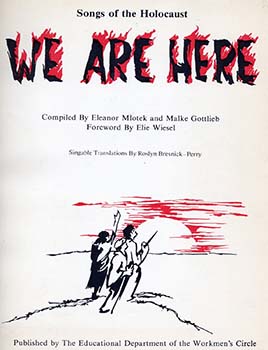Song of the Vilno ghetto by Kasriel Broydo (see note about author in Geto). Music by Yankl Troupianski (1909-1944), teacher. composer, who was deported from the ghetto to Estonia for hard labor. He died in a concentration camp in Germany.

How hard to believe now
The passing of winter
Enveloped in rags and in cold.
A sunbeam has melted
The frost from my window,
The world sends a greeting, behold!
A world bursts in bloom
And white blossoms it brings.
With little birds starting
To chirp and to sing.
But for us
It’s gray and somber,
Gloom hangs on every wall.
The sun throws us scanty sunbeams
Into our hands they fall.
Warms the tips of our fingers again,
And we take home little rays of the sun,
With our spirits somehow lighter,
Time for singing, springing free.
A soft wind, while hiding
In crack and in crevice,
Confided to me on that day:
That under the wood
Of the loose hanging gateway
The grass has arrived: it is May.
And also it told me,
The grass grows so green.
It sends us its greetings
And calls us, come in.
But for us . . .
Our father has left us
To work in the city.
A pity how far he must go.
He promised to bring home
A twig that is blooming
With buds that are white as the snow.
In crystal clear water, it’ll stand in the room
And then from the little twig, a tree will bloom.
But for us . . .
Vi shver s’iz tsu gleybn —
Farbay aza vinter
Farnuret in shmates un kelt.
A shtral hot tseshmoltsn
Dem ayz fun mayn fentster.
Gebrakht a gerus fun der velt.
A velt hot tseblit zikh
Mit vaysinkn tsvit.
Un feygelekh hobn
Getsvitshert a lid.
Nor bay undz iz
Gro un fintster,
S’hengt der umet af di vent.
Varft di zun undz karge shtraln
Klaybn mir zey mit di hent.
Varemt undz di shpits fingerlekh on,
Trogn mir aheym shtralekhlekh zun.
Un es vert undz epes gringer,
S’vilt zikh zingen, shpringen fray.
A vintele hot zikh
Farganvet durkh shpares.
A sod ayngeroymt mir derbay:
Es hot zikh haynt hinter
Dem hiltsernem parkan
Tsevaksn der roziker may.
Un vintele zogt,
Az di grezelekh grin
Zey shikn grusn
Un rufn ahin.
Nor bay undz iz. . .
Avek iz der tate
In shtot af der arbet.
Er muz azoy vayt nebekh geyn.
Er vet mir haynt brengen
A frishinkn tsvaygl
Mit bletelekh grininke sheyn.
Nu, vet es in reyninkn vaserl shteyn
Un s’vet zikh fun tsvaygl tseblien a boym.
Nor bay undz iz. . .
װי שװער ס׳איז צו גלײַבן —
פֿאַרבײַ אַזאַ װינטער
פֿאַרנורעט אין שמאַטעס און קעלט.
אַ שטראַל האָט צעשמאָלצן
דעם אײַז פֿון מײַן פֿענצטער,
געבראַכט אַ גערוס פֿון דער װעלט.
אַ װעלט האָט צעבליט זיך
מיט װײַסינקן צװיט,
און פֿײגעלעך האָבן
געצװיטשערט אַ ליד.
נאָר בײַ אונדז איז
גראָ און פֿינצטער,
ס׳הענגט דער אומעט אױף די װענט.
װאַרפֿט די זון אונדז קאַרגע שטראַלן —
קלײַבן מיר זי מיט די הענט.
װאַרעמט אונדז די שפּיץ פֿינגערלעך אָן.
טראָגן מיר אַהײם שטראַלעכלעך זון,
און עס װערט אונדז עפּעס גרינגער,
ס׳װילט זיך זינגען, שפּרינגען פֿרײַ.
אַ װינטעלע האָט זיך
פֿאַרגנבֿעט דורך שפּאַרעס,
אַ סוד אײַנגערױמט מיר דערבײַ:
עס האָט זיך הײַנט הינטער
דעם הילצערנעם פּאַרקאַן
צעװאַקסן דער ראָזיקער מײַ,
און װינטעלע זאָגט,
אַז די גרעזעלעך גרין
זײ שיקן גרוסן
און רופֿן אַהין.
נאָר בײַ אונדז איז. . .
אַװעק איז דער טאַטע
אין שטאָט אױף דער אַרבעט,
ער מוז אַזױ װײַט נעבעך גײן,
ער װעט מיר הײַנט ברענגען
אַ פֿרישינקן צװײַגל
מיט בלעטעלעך גרינינקע שײן.
נו, װעט עס אין רײנינקן װאַסערל שטײן,
און ס׳װעט זיך פֿון צװײַגל צעבליִען אַ בױם.
נאָר בײַ אונדז איז. . .
Song Title: Es Vet Zikh Fun Tsvaygl Tzeblien A Boym

Compiled by sisters Malke Gottleib and Chana Mlotek, this collection of 40 songs, issued on the occasion of the 40th anniversary of the Warsaw Ghetto Uprising, reflects the suffering, despair, longing, as well as the strength, hope and courage that led the last remnant of enfeebled Jews to take up arms against the mammoth Nazi war-machine. Save for five songs, this compilation comprises songs that were actually written or sung in the ghettos and concentration camps. Four exceptions written after the war: “Babi Yar,” “Moyshelekh un Shloymelekh,” “Kadish,” and “Mayn mame hot gevolt zayn oyf mayn khasene” are often presented at commemorative gatherings and were therefore included. The fifth song “Am Yisroel Khay” was written in a D.P. camp and is an affirmation of the will of the survivors to build new lives for themselves, holding high their belief in the endurance of the Jewish people. To enable readers and singers not conversant with the Yiddish alphabet to utilize this collection, We Are Here! Songs of the Holocaust provides parallel transliterations and singable English translations by Roslyn Bresnick Perry.